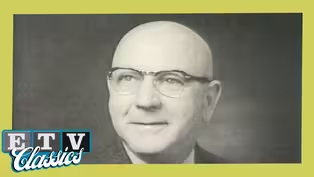ETV Classics
Profile: The Senator from Barnwell: Edgar A. Brown (1967)
Season 15 Episode 18 | 14m 42sVideo has Closed Captions
A visit with the venerable Edgar A. Brown in his law office, home, and the streets of his hometown.
A mining of the ETV Tape Vault yielded this ETV Classic from 1967, where we visit the venerable Edgar A. Brown in his law office, home, and the streets of his hometown. We find Senator Brown having endured the 1967 legislative session, the longest and what may have been the most difficult in modern times.
Problems playing video? | Closed Captioning Feedback
Problems playing video? | Closed Captioning Feedback
ETV Classics is a local public television program presented by SCETV
Support for this program is provided by The ETV Endowment of South Carolina.
ETV Classics
Profile: The Senator from Barnwell: Edgar A. Brown (1967)
Season 15 Episode 18 | 14m 42sVideo has Closed Captions
A mining of the ETV Tape Vault yielded this ETV Classic from 1967, where we visit the venerable Edgar A. Brown in his law office, home, and the streets of his hometown. We find Senator Brown having endured the 1967 legislative session, the longest and what may have been the most difficult in modern times.
Problems playing video? | Closed Captioning Feedback
How to Watch ETV Classics
ETV Classics is available to stream on pbs.org and the free PBS App, available on iPhone, Apple TV, Android TV, Android smartphones, Amazon Fire TV, Amazon Fire Tablet, Roku, Samsung Smart TV, and Vizio.
Providing Support for PBS.org
Learn Moreabout PBS online sponsorshipMore from This Collection
Open Line: Carolina to Shanxi (1980)
Video has Closed Captions
An exchange program for higher education between USC and the people of China's Shanxi Province. (28m 51s)
Charleston Place | Carolina Journal (1986)
Video has Closed Captions
This edition of "Carolina Journal" revisits the opening of the Charleston Place complex. (27m 20s)
U.S.S. South Carolina | Carolina Journal (1984)
Video has Closed Captions
Michael Collins goes aboard the missile cruiser U.S.S. South Carolina as it visits its namesake. (28m 54s)
Strom Thurmond Remembered (2003)
Video has Closed Captions
Charles Bierbauer reviews the life and accomplishments of South Carolina Senator Strom Thurmond. (1h 51m 22s)
Strom Thurmond At The Seat of Power (1982)
Video has Closed Captions
The documentary follows the life and career of Strom Thurmond. (29m 49s)
A Conversation with Justice Ernest Finney, Jr.: A Lifetime of Success (2000)
Video has Closed Captions
The honorable Judge Ernest A. Finney, Jr. discusses his life, career, and legacy in SC's lawfare. (27m 47s)
Profile: Senator John Drummond of Ninety-Six | The Big Picture (2008)
Video has Closed Captions
The life and times of Senator John Drummond of Greenwood, South Carolina. (26m 53s)
Video has Closed Captions
The memoirs of three businessmen who attribute their successes to their time in the US Marine Corps. (28m 54s)
The Governors' Roundtable | Carolina Journal (1989)
Video has Closed Captions
A round-table discussion with nine men who served as governor of the state of South Carolina. (57m 54s)
Elie Wiesel | Solomon Tenenbaum Lectureship in Jewish Studies (2006)
Video has Closed Captions
Professor Elie Wiesel, first Nobel laureate delivers a lecture as a part of the Tenenbaum series. (1h 17m 18s)
Solomon Blatt: Speaker Emeritus of the SC House | Carolina Journal (1985)
Video has Closed Captions
The life and career of Solomon Blatt, Speaker Emeritus of the S.C. House of Representatives. (27m 49s)
Remembering Bill Moyers: War in the Gulf - Town Meeting (1991)
Video has Closed Captions
Bill Moyers, who died June 26, 2025, was an award-winning journalist and PBS host. (59m 32s)
Providing Support for PBS.org
Learn Moreabout PBS online sponsorship♪ Tony Grosboll> Profile: The Senator from Barnwell ♪ ♪ We will visit with Senator Edgar A.
Brown of Barnwell in his law office, in his home and on the streets of his hometown.
Senator Brown bounced back vigorously from the rigors of the 1967 legislative session.
The longest and in many ways, the most difficult session of modern times.
Some weeks before the adjournment, the Senator had suffered a slight heart condition, which had prompted the doctors to confine him to the hospital for several days.
He came back well from this indisposition, but in the very last days of the session he was at a point of exhaustion.
Nonetheless, the Senator did the final chores as the presiding officer of the Senate, and went immediately into the hospital for several days of rest and attention.
No man in South Carolina history has served as long in the legislature, dating back to his first term in the House, which started in January 1921.
He served three two-year terms in the House, and was speaker during 1925 and 1926.
He came to the Senate in 1929 and has been there ever since.
Sen. Brown> You asked me, for instance, how I got in politics?
That's a good story... that was along about 19... 1920.
I was up in North Carolina on vacation.
(indiscernible) and old friend, judge Frank B. Gary was the judge, Frank Gary's daddy, in Columbia.
And he said, "Now son, you been admitted to the bar and practicing and you quit that- Why don't you go into politics?"
I said, "Never thought about it judge."
He said, "Run for the House.
That's the way I got started.
And I wound up in the United States Senate.
And then, Circuit Judge."
He said now, "Let me give you some advice."
I said, "I might do that next year."
Next year was election year in 1920.
He said, "Now, when you get elected, don't go up there and join Levites, Mennonites, or somebody else.
Go up there and get you- find a nail and hang up your hat and start your own party.
Tony> The history of Senator Brown, his times, his successes and his tribulations is well recorded in the book done several years ago by W.D.
Workman Jr., entitled "The Bishop From Barnwell."
"It was quite a job in those days," the senator said.
There were no welfare programs, pensions, Social Security, CCC, HEW or new deals, fair deals, new frontiers or great societies.
Somehow we got along.
But for the great majority of the people, there was very, very little.
You worked from dawn to dusk, six days a week.
You didn't work on Sunday, and practically everybody went to church.
The Senator has experienced intimate relationships with all the governors since Cole Blease just prior to World War One.
He has worked with some of them, and against some of them.
He's quite close to Governor McNair.
I never did want to be governor.
Governor had the pardoning power and I'm sort of a sympathetic, weak soul.
I never did want it.
I didn't want to turn out...
I had already been a big defense lawyer.
So that...
I came back I had my mind made up.
I learned all about state government.
Maybe I can do just as much for the state as I can in Washington, maybe more.
When I got into it, it wasn't but two or three years, before I was on the finance committee.
And in 1933, I wrote the historic appropriation bill.
That was the year we change the fiscal year from January to January to July.
We had to write an 18 months appropriation bill, for six months of that year.
And for the next year, from July to July.
And you'd be amazed to know that that bill in 1933 tabbed the fabulous appropriation for the 18 months of 9 million dollars.
Tony> And most of those things that have happened in the last half century, the development of education, highways, the industrial and agricultural economy, the coastal harbors, airports, public health, and the rest.
The leadership of Edgar Brown has been a decisive factor on the prevailing side.
He says now that he would not go back and undo much of what he has helped to bring about.
He gives credit to the hundreds of South Carolinians from every part of South Carolina who have participated through the years in the legislature, in education, and in public service, generally.
The Senator's overwhelming sense of good humor rarely departs.
His mind, even after all the grueling years remains alert and positive.
Like others reaching an advanced age, he sometimes fumbles for names or dates, but he remembers vividly even the small details of the most critical periods in the development of South Carolina.
Fierce battles in the legislature, or bitter feuds with the Governor's Office, or even fights in the courts.
But Senator Brown continues predominantly to look at the future with immense optimism for the state's progress.
Looking back, he takes pride in victories in which he has participated.
Yet he tells you now that he believes that time will prove that his championship and the pioneering of educational television in South Carolina, will be recorded as the most far reaching and beneficial program in which he has had a decisive hand.
"Nothing," he says "can do all our people more good than to take the best teaching and the most up to date information to every classroom, in every nook and cranny of the state, and at cost insignificantly low in relation to most of the other costs of education."
On the wall To the right of his desk in his Barnwell law office, hang autographed pictures of many of the men with whom he has been closely associated during his long public career.
Men like Franklin D. Roosevelt, about whom the Senator's judgment is mixed.
He praises Roosevelt for the great good he initiated and established in many areas of American life, but deplores some of the extravagances which began under Roosevelt and like the national debt, have grown and grown through the years.
Harry Truman, he opposed in Truman's time, but he readily acknowledges that Truman's record in historical perspective grows more important with the passing years.
His regard for Adlai Stevenson is high.
He admired the brilliant intellect of Stevenson.
His idealistic approach to many of the nation's problems, but he doubts that Stevenson would have been too successful as a president.
Though along with the rest of the South Carolina Delegation in 1960, he stood with Lyndon Johnson against Kennedy through the final ballot.
He later became a strong admirer of Kennedy and his resourcefulness, both as a man and a politician.
His appraisal of Lyndon Johnson as of now is not complimentary.
He feels that Johnson had a remarkable opportunity to bring the nation back to the middle of the road, but that until now he has remained out of character as judged by the record he made as leader of the U.S. Senate.
On his walls also hangs such portraits as Reverend D.W. Heichel.
Reverend Heichel took advantage of the rule of the House, which permitted him to wear his hat in the hall of the house.
There's a portrait of former Governor James F. Byrnes on this wall.
Byrnes was the Senator's best man when he married in 1913.
There's also a portrait of former Governor and Senator Olin D. Johnston, with whom the Senator had bitter legislative battles when Johnston was governor the first time.
Later, they became good friends and allies.
Discussing his health now in the late summer of 1967.
The Senator says that he feels good enough to go deep sea fishing again.
And hanging on the wall in front of his desk is a huge blue marlin, which the Senator caught while fishing off Bimini.
The Senator recalls his struggle with the big fish and it was all quite exciting to the Senator at the time, and the excitement comes back to him as he tells about it now.
Ms. Annie Lori Fort his secretary at his law offices in Barnwell knows every mood of the Senator.
She knows all about his investments.
She reminds him, if necessary, to get something done that should be done.
She gently prods his conscience.
The Senator says simply that he could not get along without her.
His letters to friends are often collector's items.
His language is free and easy.
In legislative dealings, in lawsuits, and in business affairs, his approaches are unpredictable.
In other words, he keeps the opposition guessing.
Once again, the continued legislative career of Senator Brown raises questions among the public and his friends.
People want to know if he will run again for Senator in 1968.
Because of reapportionment, the Senator ran in 1964 and in 1966.
Thus, he has had to offer for office every two years in the readjustment of the Senate when normal four year terms were temporarily interrupted.
When you talk about the Senator running for office, the truth is that he has not had opposition of any kind in the last 30 years.
So it's been simply a matter of offering himself.
And the answer as to whether he will offer himself again in 1968 is anybody's guess at this time.
But the guess is that health permitting, he will be back.
In the last several years, he has called in his senatorial colleagues with deference to their rank in seniority, and told them from time to time that they should take the lead more and more in the Senate's affairs.
There was a historic day back in May 1966, just after the Senate had agreed upon its first reapportionment program, one which ultimately was rejected by the courts.
On that day, the Senator went to the rostrum and told his colleagues that reapportionment marked the end of an era.
It was a sad speech in many ways.
The Senator had held back in the reapportionment fight.
He had told friends that he would not be a party to slicing up South Carolina, and to chopping off senators, many with whom he had served for years, who were doomed by the new pattern of senatorial reapportionment.
There were some then, who commented cynically that it was the end of the Edgar Brown era.
But this was not true because Senator Brown has always been of such great stature that practically every year has been, in a real sense, another Edgar Brown era.
When the Senator emerges from his law offices, he looks around, he knows practically everybody in Barnwell County by their first name.
He learns what they're thinking about, and no matter the relative importance, he listens and sympathizes and helps with their problems.
Then home to lunch, where he's greeted on the doorstep by Mrs. Brown.
They've been married since 1913.
Mrs. Brown loves her home and rarely makes public appearances with the Senator.
And in the late afternoon, he enters upon his happiest time of the day when he gets with the family.
In good weather, they gather on the spacious lawn of his daughter's home next door.
His only child, Emily, married Richard M. Jeffries Jr.
The son of the former governor and longtime senator from Colleton County.
Dick Jr. is one of the Senator's law partners.
The two grandchildren, a boy and a girl, are the Senator's greatest joy.
There was a time some years ago when the Senator, afflicted with laryngitis, strove mightily with the help of a loudspeaker system to address the Senate.
The next day, the newspaper reporters pointed out that his voice had been reduced to a whisper.
A day or two after that, the News and Courier , in a brief but classical editorial, reminded the people of South Carolina that Senator Brown was of such strength that a whisper from him could be heard above the roaring voices of many of the lesser men in the legislature.
It can be said now, once again, as the Senate faces another redistricting in the elections next year.
That's still another era.
The era of 50 state senators will be ended by court order to return to the constitutional number of 46 senators.
And so, health permitting, it is reasonable to speculate that the "Bishop from Barnwell" will enter upon still another Edgar Brown era, in 1968.
♪ ♪ ♪ ♪
Support for PBS provided by:
ETV Classics is a local public television program presented by SCETV
Support for this program is provided by The ETV Endowment of South Carolina.

























